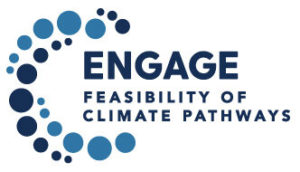Releated projects
and iniciatives
NAVIGATE: Next generation of AdVanced InteGrated Assessment modelling to support climaTE policy making

Next generation of AdVanced InteGrated Assessment modelling to support climaTE policy making’ (NAVIGATE) aims to critically improve the capability of Integrated Assessment Models (IAMs) to inform the design and evaluation of climate policies by targeting major advancements in two areas: describing transformative change in the economy, in technology and in consumer goods and services; and describing the distributional impact of climate change and climate policy. By tackling existing weaknesses and lack of capabilities of the current generation of IAMs, NAVIGATE will provide new insight into how long-term climate goals can translate into short-term policy action, and how countries and sectors can work in concert to implement the Paris Agreement. NAVIGATE is bringing together leading institutions in the field of IAMs with leading domain experts. They will provide a broad and diverse collection of state-of-the-art tools ranging from domain specific models and data to an extensive set of flagship IAMs to foster a successful implementation of the project. NAVIGATE will engage in a concerted effort to increase the usability, transparency, legitimacy and hence uptake of IAM results.
At the centre of this will be a stakeholder dialogue to elicit user needs and engage in co-production of knowledge about IAMs and their uses. This will be accompanied by the development of methodologies to better assess the robustness of IAM results, by extended model documentation and new communication tools, and by capacity-building efforts to lower the entrance barrier to IAM activities for other research teams, including research teams in less-developed countries. The NAVIGATE partners have long-standing expertise in national, EU and international climate policy advice and will actively promote uptake of project results by policymakers and international assessments.
PARIS REINFORCE: Delivering on the Paris Agreement: A demand-driven, integrated assessment modelling approach

PARIS REINFORCE aims to underpin climate policymaking with authoritative scientific processes and results, and enhance the science-policy interface, in light of the Paris Agreement and associated challenges. In particular, our aim is to develop a novel, demand-driven, IAM-oriented framework for effectively supporting the design and assessment of climate policies in the EU, as well as for other major emitters and selected lower-emission countries. Building on an exhaustive facilitative dialogue and a strong ensemble of complementary – in terms of mathematical structure, geographical, sectoral and focus coverage – integrated assessment, energy system and sectoral models, we will create an open-access and transparent data exchange platform, I2AM PARIS, in order to support the effective implementation of Nationally Determined Contributions, the preparation of future action pledges, the development of 2050 decarbonisation strategies, and the reinforcement of the 2023 Global Stocktake. We also seek to enhance the legitimacy of the scientific processes in support of climate policymaking, by introducing an innovative stakeholder inclusion framework and improving the transparency of the employed models, methods and tools.
Beyond effectively communicating respective outputs and fostering wider societal acceptance of climate policy, we actively involve policymakers and other stakeholder groups in all stages: from the formulation of policy questions and the definition of modelling assumptions in a demand-driven approach; to the design of I2AM PARIS interfaces and specifications, and the mobilisation of tacit knowledge embedded in them in the aim of bridging knowledge gaps. Finally, we will introduce innovative integrative processes, in which IAMs are further coupled with well-established methodological frameworks, in order to improve the robustness of modelling outcomes against different types of uncertainties.
ENGAGE: Exploring National and Global Actions to reduce Greenhouse gas Emissions

As the world faces the risks of dangerous climate change, policy-makers, industry and civil society leaders are counting on Integrated Assessment Models (IAMs) to inform and guide strategies to deliver on the objectives of the Paris Agreement. ENGAGE rises to this challenge by engaging these stakeholders in co-producing a new generation of global and national decarbonisation pathways. These new pathways will supplement natural science, engineering and economics, traditionally represented in IAMs, with cutting-edge insights from social science in order to reflect multidimensional feasibility of decarbonisation and identify opportunities to strengthen climate policies. The pathways will be designed to minimise overshoot of the temperature target and analyse the timing of net-zero emissions to meet the Paris temperature target and reduce the reliance on controversial negative emissions technologies. In addition, they will link national mitigation strategies of major emitters with the Paris Agreement’s objectives, integrate potential game-changing innovations, and advance conceptually novel approaches to architectures of international climate agreements. ENGAGE will also quantify avoided impacts of climate change, co-benefits and trade-offs of climate policy, and identify the biggest sectoral opportunities for climate change mitigation. In ENGAGE, we will set new standards of transparency for global and national IAMs. The new pathways will be developed in an iterative global and national stakeholder process and a consortium of leading global and national IAMs and social scientists. This co-production process ensures that the pathways are credible, legitimate, and rooted in concrete policy and industry experience, making them relevant to inform the 2023 global stocktake and feed into the mid-century strategies of major emitters.
MEDEAS: Modelling the Energy Development under Environmental And Socioeconomic constraints

MEDEAS is an ongoing (January 2016-December 2019) European project under the H2020 LCE-21-2015 topic aimed to help policy makers and stakeholders to rank priorities in the promotion of RES technologies, in order to achieve a social and economic low-carbon transition in Europe. Central outputs of MEDEAS are the three finished IAMs (MEDEAS-World and MEDEAS-Europe, and MEDEAS country-level with two case studies: Bulgaria and Austria), integrating more than 5,000 energetic, economic and environmental variables. Modelling tasks for these IAMs have already been completed successfully, and currently are being used to create scenarios and for comparison purposes.
MODESLOW: MODElling and Simulation of scenarios towards a LOW-carbon transition: the Spanish case
MODESLOW expands the MEDEAS framework to the Spanish case study. MODESLOW (January 2018-) is a Spanish national research project (ECO2017-85110-R) funded under the Spanish National Research, Development and Innovation Program focused on Societal Challenges.
The Intergovernmental Panel for Climate Change (IPCC), in its successive Assessment Reports, calls upon governments world-wide to embark on a path of transitioning to a low-carbon economy by 2050 in order to stop an irreversible process of global warming. MODELSLOW analysis the concrete challenges of such a transition by developing an integrated energy-economy-climate change simulation model which allows assessing the impact of the transition in Spain for the time period 2030-2050.
MAGIC: Moving Towards Adaptive Governance in Complexity: Informing Nexus Security

The goal of MAGIC is to transform Nexus from a shorthand to signify the complexity of the relationship between water, soils energy and climate into a set of relationship over identified factors which can be systematically used to explore this complexity. This implies integrating into the analysis social challenges and stakeholders perceptions related to the climate-water-food-energy nexus. Dialogue spaces will be opened, dissemination strategies enacted and mixed qualitative-quantitative tools developed in the context of a community building exercise transcending mechanistic scientist-policy maker separation but taking full advantage of the rich spectrum of actors and institutions active in the Nexus.
PLACARD: PLAtform for Climate Adaptation and Risk reDuction
Significant challenges exist towards strengthening the Climate Change Adaptation (CCA) and Disaster Risk Reduction (DRR) communities for coherent, mutually reinforcing and pragmatic planning and action. PLACARD seeks to support the coordination of these two communities. PLACARD will tackle current challenges by 1) providing a common ‘space’ where CCA and DRR communities can come together, share experiences and create opportunities for collaboration; 2) facilitating communication and knowledge exchange between both communities; and 3) supporting the coordination and coherence of CCA and DRR research, policy and practice.
The approach to achieving these goals is to establish a strong and operational network of networks by connecting to existing networks and boundary organisations, to foster dialogue among stakeholders (e.g. researchers, research funders, policymakers, practitioners) engaged in CCA and DRR at the international, European, national and sub-national scales.
SOCLIMPACT
The warming of the climate system is unequivocal and continued emission of greenhouse gases will cause further warming and changes. Islands are particularly vulnerable to Climate Change (CC) consequences but the coarse spatial resolution of available projections makes it difficult to derive valid statements for islands. Moreover, science-based information about the economic impacts of CC in marine and maritime sectors is scarce, and current economic models lack of solid non-market assesment. Policy makers must have accurate information about likely impact chains and about the costs and benefits of possible strategies to implement efficient measures. SOCLIMPACT aims at modelling downscaled CC effects and their socioeconomic impacts in European islands for 2030–2100, in the context of the EU Blue Economy sectors, and assess corresponding decarbonisation and adaptation pathways, complementing current available projections for Europe, and nourishing actual economic models with non-market assessment.
AdaptEconII

The present economic model of permanent growth is unstable and leads to cycles of growth, peaks and crashes. We propose to contribute to developing new economic thinking based on knowledge of global resources availability. The Adaptation to a New Economic Reality (AdaptEconII) project is divided into three parts: 1. Sustainable resource management; 2. Integrated economic systems assessment; and 3. Integrating society and economics. These components will be combined to form an overarching economic model built on socio-environmental-technical (SET) system analysis of causal links and feedback structures and system dynamics. A simple prototype of such a model (WORLD) has already been built by the applicants and tested on historical data. Twelve Early Stage Researchers (ESRs) will be trained to obtain European Joint Doctorates at three universities: University of Iceland (Reykjavik, Iceland), Stockholm University (Sweden) and Universite Blaise Pascal, Clermont-Ferrand (France). The ESRs will have secondments in research institutes/NGOs/SMEs in Germany (GWS and Wuppertal Institute), UK (New Economics Foundation and Schumacher Institute) and Sweden (Swedish National Defense College). All of the ESRs will have a career plan and be trained in system analysis and system dynamics in addition to conventional and biophysical economic paradigms. They will be presented with aspects of resource availability, links between resources and wealth, the rise of new and/or rediscovered values and realization of our interdependent world, new development paradigms, political and industrial ecology, as well as science for sustainable society and transferable skills. AdaptEconII will train ESRs in new economic thinking and the goal is for them be at the forefront of innovative economic thinking in the EU and the world.





